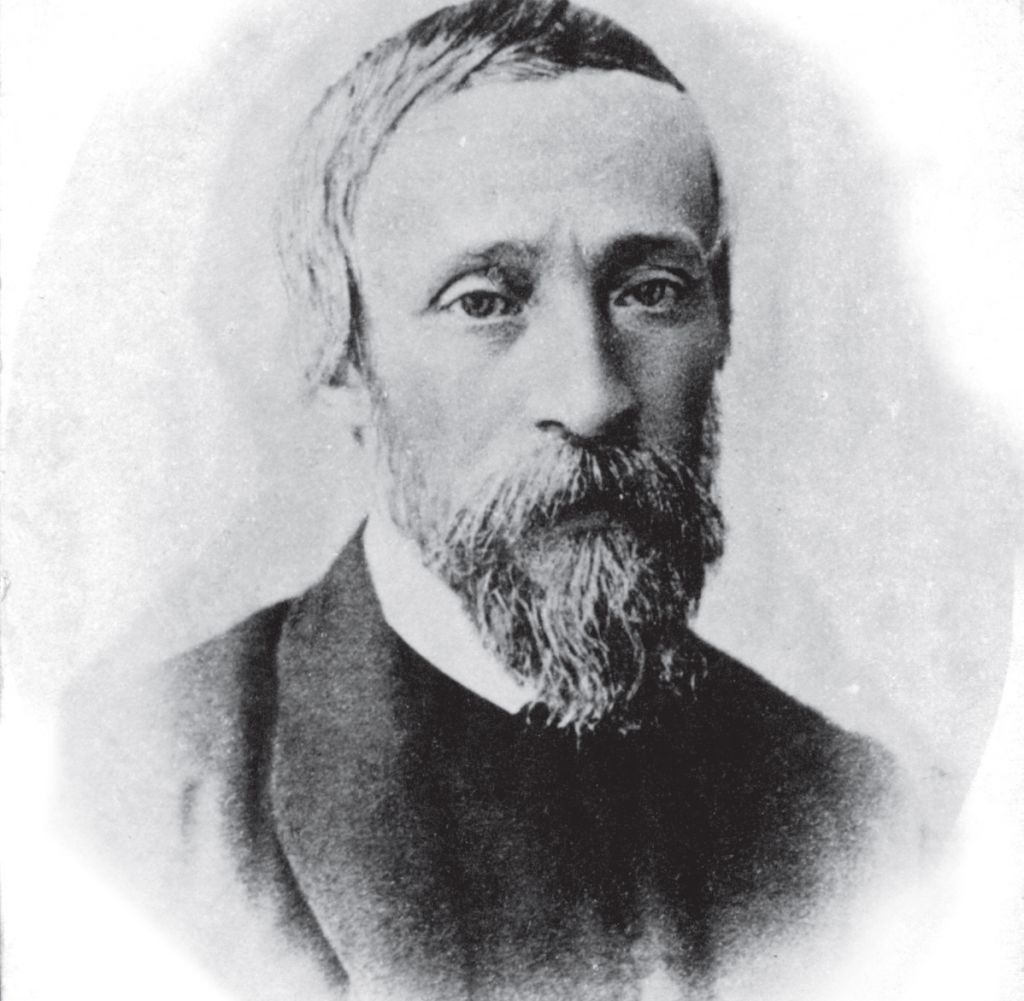Ignacy Łukasiewicz (1822–1882) – pioneer of corporate social responsibility in the oil industry

“This liquid is the future wealth of the country, it is welfare and prosperity for its inhabitants, it is a new source of income for the poor and a new branch of industry that will bear generous fruit.”
“To be rich is a great feat, and also a great responsibility.”
The history of the Polish oil industry mentions only two of its pioneers: Ignacy Łukasiewicz, whom it calls the “creator of the oil industry”, and Stanisław Szczepanowski, whom it describes as “a pioneer in the development of oil mining.”
Son of an insurgent
Ignacy Łukasiewicz was born in 1822 in Zaduszniki, and died in 1882 in Chorkówka. He was the fifth child of Apolonia and Józef Łukasiewicz. His father moved to Galicia from Płock after taking part in the Kościuszko Insurrection. The Łukasiewicz family took the village of Zaduszniki on lease and lived modestly as landowners, keeping the memory of the uprising alive. The future pioneer of oil mining received a very patriotic education at home, which in a dozen or so years would even lead to his imprisonment.
A rebellious student
Around 1830, Ignacy, alongside his father his brothers moved to Rzeszów, where he also attended high school. His restless spirit and memory of his father’s brave deeds did not allow him to be satisfied with the education based solely on German standards. Like other young people, he secretly studied Polish history and literature, hungrily devouring the works of Romanticism. When he was thirteen, he even took part in his first school strike, for which he was sentenced to twelve hours in solitary confinement. Financial problems and illness, and then his father’s death, forced Łukasiewicz to discontinue his studies in 1836.
Conspirator
The miserable financial situation of the family forced him to take up work at a pharmacy in Łańcut. This decision, as it soon turned out, was fraught with consequences for a young man interested in chemistry and physics. After a few years, Łukasiewicz passed his professional exam, which allowed him to become a pharmacy assistant. In 1841 he returned to Rzeszów and found employment at a local pharmacy. A job in a larger city enabled him to establish closer ties with representatives of the revolutionary movement – in 1845 he even became an agent. He assisted in the preparations for the planned uprising, which was to be led by Ludwik Mierosławski. Unfortunately, the Austrian police was able to track down Łukasiewicz, and as the result, he was imprisoned in the Rzeszów prison for two years.
Pharmacist
When, at the end of 1847, Łukasiewicz was released, he had rethought what it meant to work for the sake of Poland. He came to the conclusion that one could protect the interests of the country not only on the battlefield. Remaining under the police supervision, he moved to Lviv and began working as a pharmacy assistant at Piotr Mikolasch’s pharmacy “The Golden Star”, where he joined Jan Zeh, who worked on the distillation of rock oil, as commissioned by the pharmacy owner. Thanks to his conscientious work, he obtained a permission from the Austrian authorities to pursue studies at the Jagiellonian University in the years 1850-1852. He graduated in Vienna, where on July 30, 1852, he was awarded a master’s degree in pharmacy. After returning from university, he returned to work at Mikolasch’s pharmacy and to the experiments on the distillation of crude oil. The success of Zeh and Łukasiewicz consisted in obtaining a preparation without light fractions such as gasoline (which increases the safety of using the preparation, thanks to lowering its self-ignition temperature), at a temperature of 200-250 degrees Celsius, and separated it in the apparatus from heavy hydrocarbons, such as asphalts or technical oils (which reduces soot deposition, i.e. the side effect of combustion). At that time, the two pharmacists came up with the idea of using the obtained product in a completely new way: for lighting. Attempts to set the product on fire, however, ended in explosions. Only with the help of the tinsmith, Adam Bratkowski, did they manage to construct a lamp which not only withstood the flame, but also effectively emitted light. In March 1853, the lamp illuminated the shop window of Mikolasch’s pharmacy.
The first company (2400 guldens) and first sale (500 kilograms of kerosene)
In the same year, Mikolasch-Zeh-Łukasiewicz company (800 Austro-Hungarian guldens from each partner) found the first customer who bought 500 kilograms of kerosene with along with kerosene lamps. It was the Lviv hospital, where on July 31st, 1853, the first night-time operation was possible to be carried out in the light of kerosene lamps. Soon, however, the partners went their separate ways. Jan Zeh stayed in Lviv, where he started a petroleum products store, whereas Łukasiewicz went to Gorlice.
Entrepreneur and innovator
Łukasiewicz leased a pharmacy in Gorlice, where he continued – near the oil deposits – his work on kerosene. It was here that in 1854 his lamp illuminated the city street for the first time. The fame surrounding Łukasiewicz reached the landowner Tytus Trzecieski, ruined as a result of the Galician Slaughter, who brought him a potful of rock oil seeping out on his estate in Polanka. Łukasiewicz was to say in joy: “You bring millions with you. This liquid is the future wealth of the country, it is welfare and prosperity for its inhabitants, it is a new source of income for the poor and a new branch of industry that will bear generous fruit.”
The initial capital of the established Łukasiewicz-Trzecieski oil company was 2,400 Austro-Hungarian guldens. The company operated during the period of 1854-1861.
The extraction started in Bóbrka, which belonged to Trzecieski’s neighbour, Karol Klobassa. However, the stored oil had to be processed somewhere. Thus, in 1856, Łukasiewicz founded his own refinery for three boilers in Ulaszowice near Jasło. His financial situation was disastrous then, so he applied unsuccessfully for the job of a municipal cashier in Gorlice. In 1858, his products – kerosene for lighting, oil and grease for lubricating machines and asphalts – were presented at the exhibition of livestock in Jasło. Łukasiewicz received the praise and diploma. In 1873 he took part in an international exhibition in Vienna, and in 1877 in a national exhibition in Lviv. He established an oil store in Kraków and started to seek recommendations from chemistry experts for his products. All this contributed to the improvement of sales results – the company began to develop intensively.
The issue of the Łukasiewicz company with the Zieliński brothers from Klęczany seems to be intriguing, as they had a land rich in raw materials. The company provided kerosene supplies to the most important cities of the Danube monarchy. With time, the atmosphere in the company began to sour – Zieliński brothers underestimated Ignacy’s philanthropic ideas, who sought to reduce the price of the product.
In 1861, the company of Łukasiewicz and Trzecieski joined Karol Klobassa. The three-member company acted on the basis of an oral agreement for ten years (1861-1871) and made millions in profits to its shareholders. The partners improved the drilling technique. Manual digging was replaced by manual impact drilling, which was possible thanks to the cooperation with a mining engineer and geologist Henryk Walter, while thanks to the engineer Albert Fauck, steam engines were introduced in the mine, which allowed for drilling up to 200 meters.
After the dissolution of Klobassa-Łukasiewicz-Trzecieski company in 1871, Klobassa became the owner of the mine in Bóbrka, and Łukasiewicz took up the post of a director for life. Łukasiewicz built a manor house, as well as a new refinery in his estate in Chorkówka, where he processed petroleum from Bóbrka.
In 1872, director Łukasiewicz sent his close associate Adolf Jabłoński to the United States in order to gain knowledge about the latest drilling tools and methods. Jabłoński returned from America in 1873 and brought the necessary information about the construction of bits or casing the bore-holes, and also began to introduce his own innovations (such as Jabłoński’s bell for closing the inflow of ground water).
Philanthropist and politician
The money did not override Łukasiewicz the fate of the usual oil worker. He was considered to be a good and righteous employer. He helped his employees in need, and also introduced the labour insurance called the miner’s relief fund, to which each employee should pay contributions. In the mine in Bóbrka, the insurance contribution was 3 cents of every gulden they earned. In the event of accidents, illnesses or the death of a worker, the family received financial support from the miner’s relief fund. Łukasiewicz also organised so-called communal saving banks, which provided short-term no-interest loans to workers. He also gave money to the education of workers’ children, establishing schools and nurseries. He promoted and financed planting fruit trees alongside public roads.
He used his entrepreneurial experience in political activities. In 1868 he became a member of the district council and department in Krosno. He contributed to the construction of solid bridges and roads in Galicia. It was said then that the roads are paved with Łukasiewicz gulden. As a member of the national parliament in Lviv (1877-1881), he called for the improvement of the economic conditions in Galicia. Among the Galician workers, he had special respect and sympathy – several thousand people came to his funeral.
Inspirations:
- Bonusiak Włodzimierz, Szejk z Galicji. Ignacy Łukasiewicz (The Sheikh of Galicia. Ignacy Łukasiewicz) 1822–1882, Rzeszów 2007
- Brzozowski Stanisław, Ignacy Łukasiewicz, Warszawa 1974
- Brzozowski Stanisław, Jan Józef Ignacy Łukasiewicz, [in:] Internetowy polski słownik biograficzny (Polish internet biographical dictionary), developed by Polska Akademia Nauk i Polska Akademia Umiejętności, published by: Narodowy Instytut Audiowizualny.
- Historia polskiego przemysłu naftowego (History of the Polish Oil Industry), ed. Ryszard Wolwowicz, Brzozów–Kraków 1994–1995
- Od nafciarza do społecznika (From oilman to social activist), developed by Instytut Łukasiewicza, Kraków 2013
- Roeske Wojciech, Ignacy Łukasiewicz 1822–1882, Warszawa 1962
source of photographs: Fundacja Muzeum Przemysłu Naftowego i Gazowniczego im. Ignacego Łukasiewicza w Bóbrce

